30 Dec

In this article we will discuss BigCommerce VS Shopify. Choosing your platform is not easy. All E-Commerce website are not created same.
BigCommerce and Shopify are amazing in their own ways. Both platforms have made their own place in markets. They offer the most impressive features at really affordable prices, while remaining easy to use also.
Content and managing tons of SKU is better with BigCommerce than Shopify. On the other, hand Shopify is ideal for smaller boutiques or dropshipping. By the end of this comparison, you will hopefully know which of these two products represents the best e-commerce platform for your particular business.
We look at their features, pricing, design, ease of use – basically, everything that a person who’s planning to launch an ecommerce store would want to know.
BigCommerce :
BigCommerce is a privately held technology company and provides a SaaS (Software as a Service) ecommerce platform. This is the best e-commerce platform ideal for larger retail brands.
Furthermore, It allows you to do everything yourself, including add products, upload photos, process orders, create pages, create discount coupons, and more. You can also design your store with it, using drag and drop panels.
Its robust product search is ideal if you plan on selling many products. BigCommerce offers many features than Shopify.
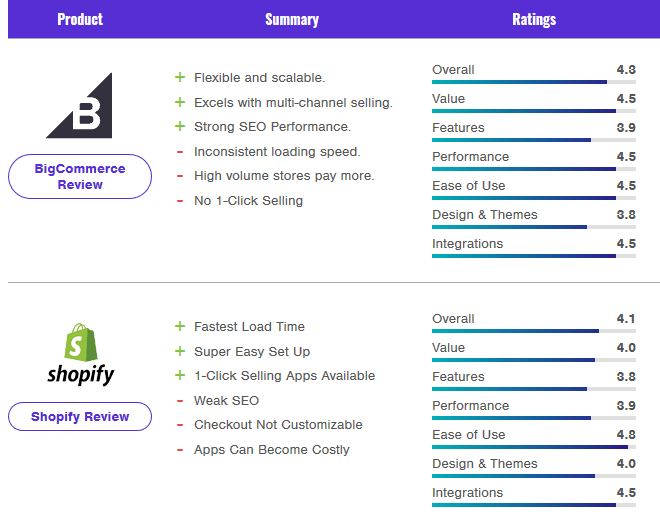
Shopify :
Shopify is also one the leading e-commerce platform. It can be used without any expert’s help. It is a complete e-commerce solution which come with build in tools required for an e-store.
Also, if you are a new comer in e-commerce market and don’t have any idea for marketing or anything else than Shopify is the best choice for you.
Shopify hosts your website for you. Moreover, Shopify have a range of beautiful themes with 2-3 variants. Most importantly they have great customer support service.
On top of that, with Shopify you don’t have to install, manage or update any software. Plus you don’t have to worry about security or back-ups.
What do BigCommerce and Shopify do?
BigCommerce and Shopify both are website building platforms. The main feature of both is that you can easily build your store without coding. All that you need to do is just pick a theme from the range provided, upload your products, set the prices and you are ready to launch.
In addition to this BigCommerce and Shopify are ‘software as a service’ (Saas) tools. This means that there is an ongoing cost to use them – you pay a monthly or annual fee for access to the software.
Similarly, both platforms run in a web browser which means you don’t need to download on laptop or PC. And you can manage your store from anywhere all you need is an internet connection.
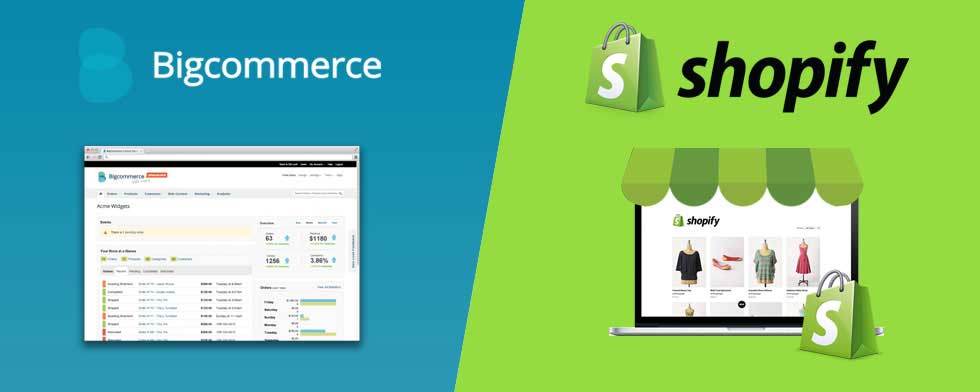
What is the difference between BigCommerce and Shopify?
BigCommerce and Shopify seems similar at first glance. Both are dedicated selling platforms, the main difference between them is:
BigCommerce is built for supercharging your store’s growth – a main attraction is that all its tools come built-in, so that you don’t rely on apps. In contrast, Shopify’s huge app store is its pride and joy, providing users with all the features they could need to grow their stores.
Which is easiest to use BigCommerce OR Shopify ?
People find it easy to use and easy to set up their e-commerce site on this platform. For BigCommerce users found the editor difficult to navigate and the language hard to understand.
This makes BigCommerce less than ideal for beginners. Overall, Shopify scored higher for ease of use than BigCommerce.
BigCommerec’s built-in features make it much harder platform to get used to it. Shopify beats it because of its simple and user-friendly design.

BigCommerce – Pros and Cons
Pros:
- Real-time shipping quotes and gift cards available out of the box
- Better cart abandonment recovery setup
- Built to make marketing your site easy with SEO tools galore, BigCommerce dominates in search engine optimization
- Support multi-channel selling
Cons:
- Selling limits
- Complex terminology makes it unsuitable for beginners
- Fewer apps and integrations than Shopify
- No built-in 1-click selling
Shopify – Pros and Cons
Pros:
- No selling limits
- More integrations and apps
- Faster load time and speed
- Generally easier to set up
- Brilliant inventory system
Cons:
- You need third-party apps to get the functionality you want
- SEO features not as strong
- Transaction fees for third-party gateways
- Switching templates mean reformatting your site
BigCommerce VS Shopify – Pricing plans
Both BigCommerce and Shopify offer free trials. Shopify’s three price plans range from $29 to $299 per month. BigCommerce’s pricing plans start from $29.95 per month and range up to custom pricing on the most advanced plan. Upgrade to scale your store.
Moreover, three pricing plan allows you to grow your store. The Shopify Basic plan has everything you need to launch your business, including abandoned cart recovery, 24/7 support, and an unlimited number of products to sell through your store. With Shopify, adding third party apps can also push up your monthly costs.
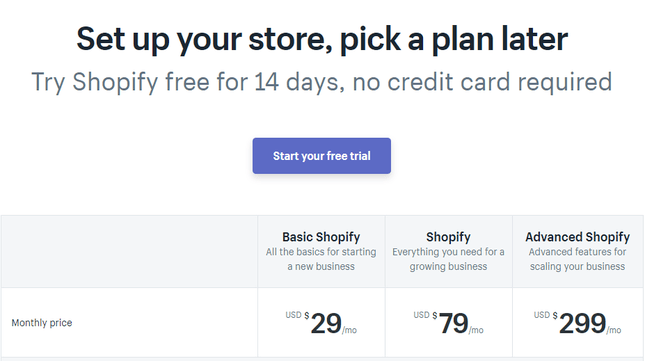
While using BigCommerce, you unlock features such as abandoned cart recovery when you upgrade from the lowest price plan to the $71.95 per month Plus plan.
The BigCommerce Plus plan is the most popular yet the cheapest is Standard plan that provides all the features you need to set up a store. Still, make sure you look at the features on offer with each plan, rather than just going by price alone. However, BigCommerce takes then win because of its built in features and fewer additional costs.
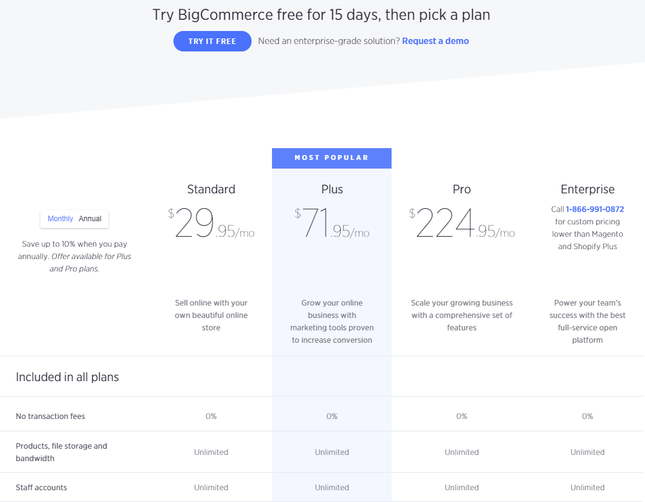
BigCommerce VS Shopify – Customer Support service:
Whether you choose Shopify or BigCommerce, you’ll get access to the following support options:
- 24/7 phone
- 24/7 live chat
- Help center
- Support forum
- Video tutorials
- Advanced specialist support
Both e-commerce builder have multiple help channels, But Shopify has the extra addition of social media support. In this Shopify wins the customer support.

BigCommerce VS Shopify – Themes:
It’s easy to find your perfect theme by searching via layout, size of store, industry, navigation style, and more. Whether looking for a free theme or paid they have both variety available. You can change themes at any time, although some of your content need reformatting.
Shopify themes are easy to customize and professional look themes. All of Shopify’s themes are mobile responsive and will automatically reformat to fit the appropriate screen size.

Furthermore, BigCommerce have 12 free themes over 50 purchasable ones. There is a wide range of industries to choose from. While choosing your theme with BigCommerce, it’s important to make sure you’re picking one that’s suitable for your industry.
Choosing your theme with BigCommerce, it’s important to make sure you’re picking one that’s suitable for your industry. This gives you much greater creative control over your ecommerce site, and makes editing your store much easier
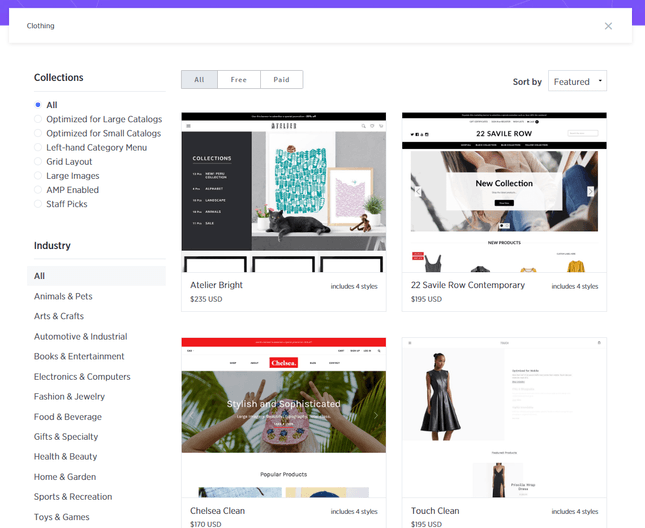
Conclusion – BigCommerce VS Shopify:
They are big competitors, but there are some difference so let’s have a quick recap to make is more understandable for you.
Shopify is easier to use, whereas BigCommerce is more difficult to get grip on while it is great for large business. BigCommerce has all built-in features your store needs, without depending on third party. Therefore, this makes your store grow more on e-commerce platform.
In Addition, Shopify is best for entrepreneurs who are just starting out and want a platform that they can use right away, with less learning and simple structure, yet it have all the powerful features you might need.
Once you learn which user base platform is targeting, the differences start to become clearer. Hopefully now you can understand which of these two products represents the best e-commerce platform for your particular business.
See why is Shopify a good way to start an E-Commerce.
